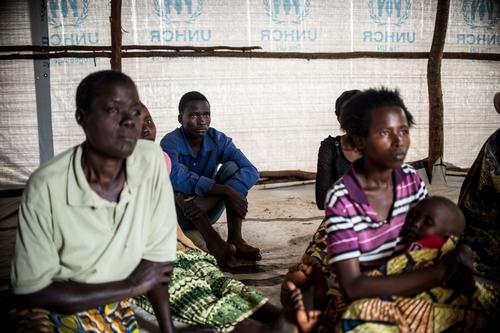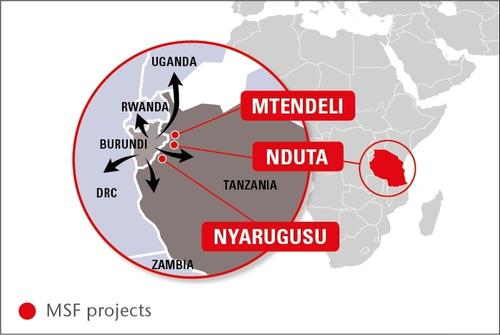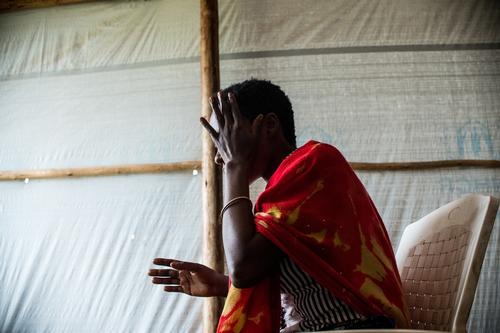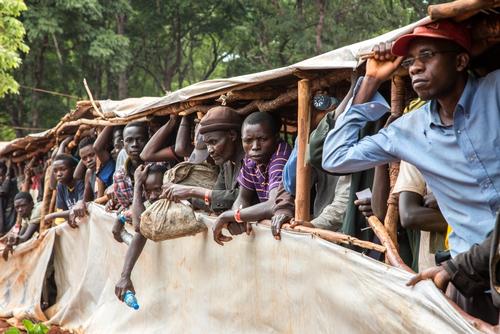More than one year after the first influx of refugees began, some 1,000 people escaping political unrest in Burundi continue to flee across the border each week to Tanzania joining thousands of others living in overcrowded and ever-expanding refugee camps.

Two of the three existing sites – Nyarugusu and Nduta – have already swelled to capacity. A third camp, Mtendeli is now receiving refugees who are transferred from the overcrowded Nyarugusu camp, as well as newly arrived refugees from the border areas.
There are now approximately 140,000 Burundians living in Tanzania, and it’s a number which grows each day.
“With the flow of refugees continuing at a steady pace, we expect all three camps will have exceeded their capacity by September,” says Dana Krause, Head of Mission for Médecins Sans Frontières (MSF) in Tanzania. The camps are unable to deal with a sudden influx of refugees, and if the crisis in Burundi sees another flare-up, there is no other site ready.
“In Mtendeli for example, water provision is already below internationally recognized standards. At this stage, the camp is not able to welcome any major influx of Burundian refugees beyond the current numbers,” says Krause.
There are a total of 260,000 Burundian refugees who have fled to the surrounding countries of Rwanda, Uganda, Democratic Republic of Congo and Tanzania. Fleeing out of fear, they have often witnessed or experienced violence directly.
Little financial support has been given to the aid response. “In Tanzania, the humanitarian response one year later in the camps is still lacking, and not enough efforts have been made to increase assistance,” continues Krause.
Today, on arrival to Tanzania, the refugees face highly congested living conditions. Health facilities are bursting at the seams with malaria patients, while respiratory illnesses and diarrhoeal diseases linked to the poor sanitary situation are also recurrent. Additionally, mental health needs among this recently traumatized population are significant.

Acute mental health needs
MSF is providing psychological care in Nyarugusu and Nduta camps and since the beginning of the year has carried out 13,795 individual consultations and 1,408 group sessions. According to MSF’s psychologists, over 95 percent of refugees attending mental health consultations have reported experiencing significant traumatic events before reaching Tanzania and most now suffer from a combination of depression, anxiety and sleeping problems.
“The patients we see in our mental health consultations have all suffered enormous trauma, and are experiencing a wide range of emotional difficulties,” says George Hunter, MSF psychologist working in Nduta camp. “They’ve lost everything. Six months ago, they were living a normal life in a city, their kids were going to school. Then they witnessed terrible violence, or lost family members or friends. They were forced to flee, and now they live in a tent, with nothing.”
Joseph is a refugee living in Nduta camp: “When I arrived I could not sleep as I was thinking about all of the things that I had left behind. I was thinking that this would be the end of my life. I’m still scared, it doesn’t feel safe yet. I don’t see any future. I hoped to pursue and complete my university studies. But now that I am here, that dream is gone.”
One in two patients with malaria in Nyarugusu and Nduta camps
Kigoma region, where the camps are located, has one of the highest annual rates of malaria in Tanzania. Pregnant women and children are particularly at risk of developing the severe form of the disease, which can lead to death if not promptly treated.
Around half of patients coming to MSF clinics in Nyarugusu and Nduta refugee camps are presenting with malaria. In both camps, MSF has treated around 58,000 malaria patients since the beginning of the year.
MSF scaled up its malaria response in January when the rains became heavier and the number of cases started increasing. In Nduta camp, MSF is providing treatment at its three health posts and the outpatient department, and patients with severe malaria are hospitalized. In Nyarugusu camp, MSF is providing treatment in two clinics that have been set up specifically for treatment of the disease.
“While in the last weeks malaria cases have started dropping slightly, we can assume there will be another increase soon,” says Krause. “The rains are expected to continue until at least June making the already damp and overcrowded living conditions even worse, and a breeding ground for mosquitoes. The only solution to avoid this is a rapid and sustained improvement in prevention and treatment measures.”
Emergency medical care for wounded in Burundi
In Burundi, MSF continues to respond to trauma-related medical emergencies in the capital, Bujumbura. The MSF trauma centre has 86 beds and comprises an emergency room, two operating rooms and an intensive care unit.
MSF began responding to the Burundian refugee crisis in Tanzania in May 2015 when violence flared and the first influx of people arrived. In Nyarugusu camp , MSF is running three malaria clinics. In Nduta camp, MSF is the only medical provider and has constructed a 110-bed hospital delivering comprehensive inpatient and outpatient care. Teams are also running three health posts, providing medical screening for newly arrived refugees and delivering much-needed mental healthcare. When the camp was being set up, MSF provided 3,500 tents and is also currently providing 250 cubic metres of water per day. In Mtendeli camp, MSF is supplying around 428,000 litres of water daily and supports the health sector with community health surveillance. MSF has also distributed some 73,000 thousand mosquito nets in Nyarugusu, Nduta and Mtendeli camps.
MSF has been working in Burundi for more than 20 years and intensified its activities in Bujumbura when pre-electoral tensions began to mount in May 2015. MSF is one of the only international organizations treating the wounded and responding to medical emergencies in the capital. Its activities in Burundi are financed solely by individual contributions. MSF does not accept funds from any government.





